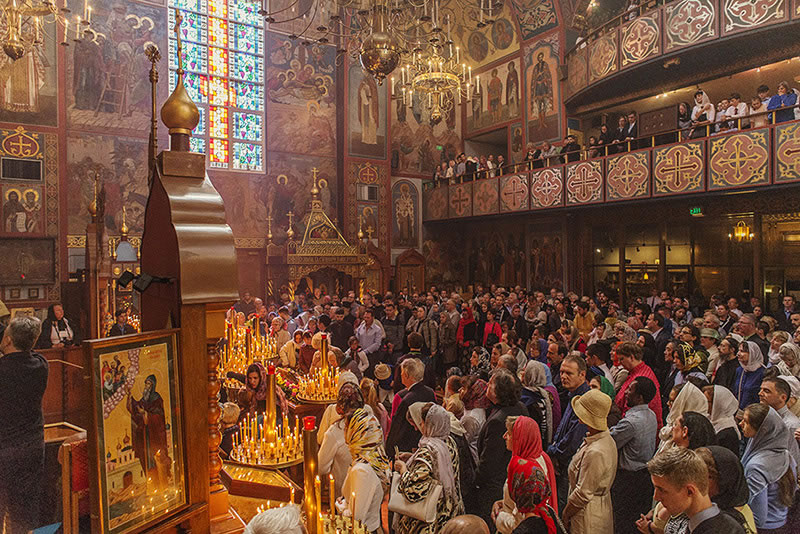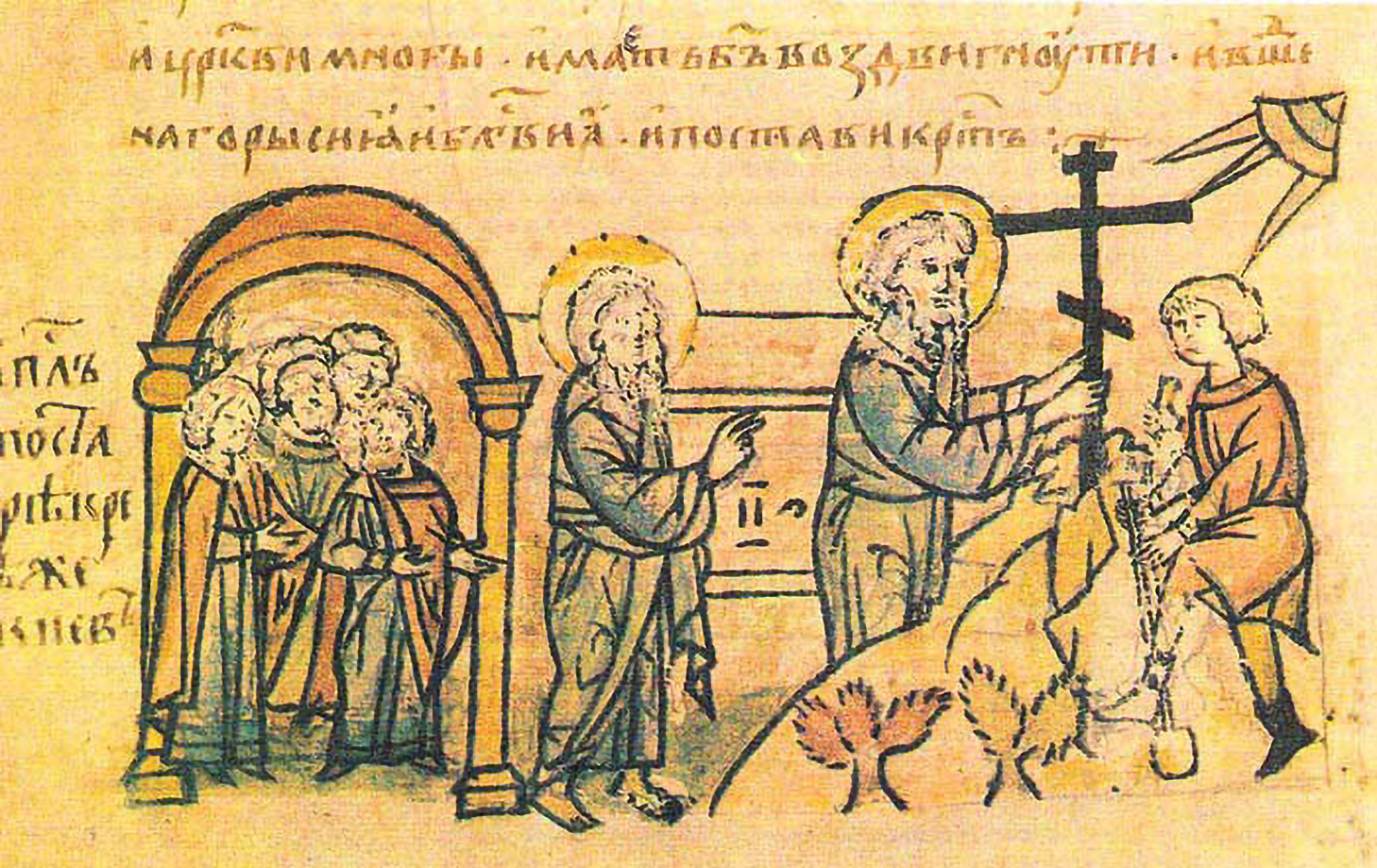Wednesday in the First Week of Advent – the Feast of Saint Andrew, Apostle: Romans 10:9-18, Matthew 4:18-22.
Today we celebrate the Feast of an Apostle – St. Andrew, to be precise. The readings mark his calling and celebrate the evangelical work of all the apostles. Feasts stud the liturgical calendar like cloves spiked into the oranges of a fragrant mulled cider. They interrupt liturgical seasons like prairie dogs sticking their heads out of their holes in seemingly flat landscape. Yet despite their seeming incongruity and randomness with respect to the liturgical seasons, they always point back to the great revelation of God in our midst and help us deepen our ongoing festival of the Lord.

What does it mean to feast? What is the nature of a festival? German Catholic philosopher Josef Pieper (1904-1997) has written several books that look closely at these questions and provide us with a proper understanding. Pieper acknowledges that a festival is a “day of rejoicing” and, more profoundly, that “joy is the response of a lover receiving what he loves” (In Tune with the World, 18). He musters St. John Chrysostom as proof – the great saint wrote, “Ubi caritas gaudete, ibi est festivitas,” “Where love rejoices, there is festivity.” True joy, true festival, means that love is at work, responding to something sublime that is the object of what the feasting person longs for. The next move Pieper makes in his small, must-read book, In Tune with the World, interestingly uses a note from Frederich Nietzsche in Book IV of his Will to Power: “To have joy in anything, one must approve everything.” Pieper latches onto this insight and writes:
Festivity lives on affirmation. Even celebrations for the dead, All Souls and Good Friday, can never be truly celebrated except on the basis of faith that all is well with the world and life as a whole. If there is no consolation, the idea of a funeral as a solemn act is self-contradictory … Consolation exists only on the premise that grief, sorrow, death, are accepted, and therefore affirmed, as meaningful in spite of everything. … To celebrate a festival means: to live out, for some special occasion and in an uncommon manner, the universal assent to the world as a whole (21, 23).
Finally, Pieper can connect the dots for us: “there can be no more radical assent to the world than the praise of God, the lauding of the Creator of this same world. One cannot conceive a more intense, more unconditional affirmation of being” (24). Aha! So, my praise of God is an assent to all that He has created. Can I get an Amen?? To me, this makes a lot of sense. Folding back in Chrysostom’s phrase, where love rejoices, this compounds the need to define festival in relationship to God, who is pure love. True festival and feasting mean partaking in the very joyous love that God offers us, it means stopping our usual utilitarian work and activity to simply feast with Him on love.
I go to the trouble of defining feasting because, as Pieper details, there are many false festivals in today’s culture. We can’t simply make ourselves happy without reason. We can’t pretend to celebrate something that is hollow in its core. True feasting, with thankfulness for God and his Creation at its heart, is the most important activity that humans can do – and the highest form of this feasting occurs in the liturgy. Our rituals of prayer, thanksgiving, sacrament, and community are the truest and purest form of festival that we can encounter on earth. All other festivals have meaning to the degree that they participate in liturgical festivity. Fourth of July? Not so much. Halloween? No, sir. Christmas? Of course (if done right)!

Special feasts during the liturgical year are not interruptions of a season, but punctuations. Every aspect of liturgy participates in the gift of the Holy Spirit, the constantly reciprocated divine love that is the Trinity. Feasts allow us to contemplate different ways the love of the Trinity has dwelt with humanity. Notably, Christ is the center of these since he is the Incarnation of the divinity, our Chief Priest, our intercessor with the Father. When we celebrate a feast day, we have the opportunity to dwell with God outside of work and utilitarian effort, to reflect upon the focus of the feast and rejoice in thankfulness. What’s more, we celebrate alongside the saints and angels in heaven!
So, we celebrate with Andrew, brother of Simon Peter, today. We consider his courage and the ray of faith and trust that must have pierced his heart when Jesus met them on the shores of Galilee, inviting them to drop their nets and follow him. We pat him on his heavenly back for such courage and faith! We put our arms around his shoulders to walk with him during Christ’s ministry, Passion, death and Resurrection. And then we gaze on him lovingly as he sets about evangelizing in the world after the Holy Spirit descends and sets the apostles afire. For, as St. Paul writes in the first reading today, “But how can they call on him in whom they have not believed? And how can they believe in him of whom they have not heard? And how can they hear without someone to preach?” Feasting with St. Paul and St. Andrew, they reveal to us that they didn’t think twice about traveling around the Levant and Asia – souls needed to hear about Jesus Christ so that they could be saved. As we remember the great stories of St. Andrew in the Byzantine Church – that he went through what was to become Constantinople, traveled all around the Black Sea into what is today’s Ukraine, all the way up the Dnieper River to the future location of Kyiv, where he erected a cross on the site where the Saint Andrew’s Church of Kyiv currently stands, and where he prophesied the foundation of a great Christian city – we can imagine hearing his great seafaring tales over mugs of beer. This is a feast, after all! We affirm the world that God created, in its need for salvation, in its tales of adventure, sacrifice, strife, joy, and love.

And of course feast days can shed light on the liturgical season in which they fall; they are both rooted in the same constant festival of the liturgy. The Feast of St. Andrew sheds light on the Advent season, too. Andrew and the Apostles are our link to the Christ Event that we prepare for. They are the ones who saw and believed, who preached and spread the Word so that we, too, could become brothers and sisters in Christ. Without Andrew and the other Apostles, we would not be celebrating Advent and would be stuck in pagan ways, ignorant of the saving grace of Christ. So, with them and the angels, we await to greet Christ at his birth and again at his second coming.